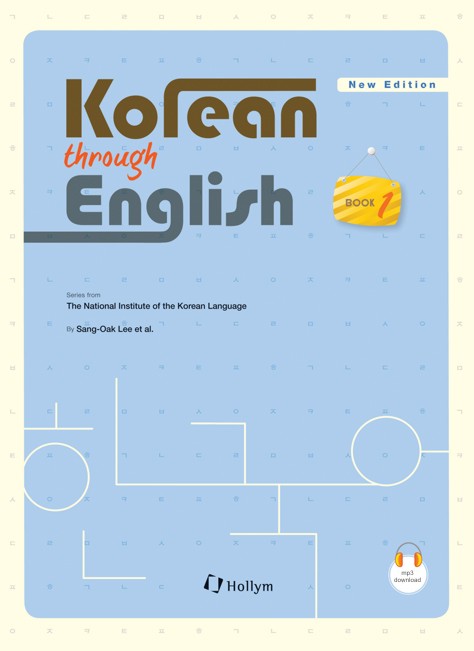The National Institute of the Korean Language
Korean through English: Book 1 with MP3 Audio Download
14,90 €*
% 19,90 €* (25.13% gespart)-
Art.Nr./ISBN: 9781565913158
-
Verlag: Hollym
-
Seitenzahl: 184
-
Einband: Softcover
-
Jahr: 2012, 6th printing 2019
-
Sprache: English, Korean
-
Medientyp: Book + MP3 Download
-
Autor: The National Institute of the Korean Language
Auf Lager. Versandfertig in 1-3 Werktagen
Produktinformationen "Korean through English: Book 1 with MP3 Audio Download"
The Best Textbook Series for Learning the Korean Language by the Leading Experts in Korea
Download Audiofiles HERE - HIER Audiodateien herunterladen
-The National Institute of the Korean Language and Language Education Institute at Seoul National University
Originally consisted of three volumes, Korean through English series was first published in 1992 and has widely been used as easy yet educational textbook series for foreign learners of Korean. In 2012, the new edition is published in two volumes, keeping the major learning objectives as the previous version and meeting new trends and learners' needs. Book One is designed for beginners who start to learn Korean as a foreign or second language for the first time. The textbook is to help the learners understand the fundamental system of Korean letters (hangeul) and acquire basic vocabulary and grammatical items. Book Two, which is forthcoming, targets intermediate learners who should advance their Korean language skills to the upper level. The textbook is to help them become more confident of using the Korean language with accuracy and fluency. The current revision has been made by Sang-Oak Lee who wrote the original version and Seungmie Lee at the Language Education Institute of Seoul National University.
Systematical Organization to Fit for the Learners' Level and Needs
Korean through English Book One, designed for beginners, consists of 25 lessons. Lessons 1 through 4 are devoted to introduction and practice of the Korean alphabet, hangeul, and also include writing and reading exercises with detailed stroke orders to help students familiarize themselves with hangeul. Lessons 5 through 25 are made up of Vocabulary, Pronunciation, Conversation, Grammar, and Exercise. Several lessons include Information at the end of the lesson and it is supplement to help learners understand Korean culture more deeply.
In the beginning of every lesson, the new vocabularies of the lessons are accompanied by a short gloss in English. These glosses provide a general idea of the meaning of the words of following conversation part.
A brief pronunciation guide to Korean words singles out vocabulary items which are unusual or which have proven particularly difficult for English speakers.
In the Conversation section, every effort has been made to provide both realistic and interesting dialogues. They have chosen to focus more on the everyday-life and modern cultural features which the students are more likely to encounter. The authors have also included varied notes on Korean culture and language that are necessary in learning Korean.
The Grammar items covered were also selected according to their high-frequency of occurrence in modern Korean and the explanations are presented in English.
Copious Exercises give students opportunity to practice and use the new vocabulary and grammar presented in each lesson. Besides, the cultural columns on Korea are supplements to help students understand important aspects of Korean culture that would be unfamiliar to most foreigners.
The "Information," when possible, picks up the theme of the main text and is designed to enhance the understanding of traditional culture and modern society of Korea.
CONTENTS
머리말 Preface
단원 구성표 Lesson Details
01 한글(1) Basic Letters
02 한글(2) Tense and Aspirated Consonants
03 한글(3) Compound Vowels
04 한글(4) Consonants at the Bottom
05 안녕하세요? Hello?
06 저는 학생이에요. I am a student.
07 얼마예요? How much is it?
08 비빔밥을 좋아해요. I like (eating) bibimbap.
09 서울 지도 한 장 주세요. Please give me a map of Seoul.
10 어제 뭐 했어요? What did you do yesterday?
11 날씨가 더워요. The weather is hot.
12 오늘은 화요일이에요. Today is Tuesday.
13 1시에 만나요. Let’s meet at 1 o’clock.
14 가방을 어머니께 드릴 거예요. I am going to give the bag to my mother.
15 나중에 다시 올게요. I will come back later.
16 감기에 걸렸어요. I caught a cold.
17 한국어를 배우고 있어요. I am learning Korean.
18 박물관에 어떻게 가요? How do I go to the museum?
19 부모님은 부산에 사세요. My parents live in Busan.
20 전화번호를 몰라요. I don’t know the telephone number.
21 숙제가 어려워서 못했어요. I couldn’t do the homework because it was too difficult.
22 매운 음식을 좋아해요. I like spicy food.
23 커피는 차가운 거 드릴까요? Shall I get you a cold coffee?
24 여행 가방 좀 빌려주세요. Please lend me your travel bag.
25 걸어가면 한 시간쯤 걸려요. It will take about an hour if you walk.
부록 Appendices
영어권 학습자를 위한 한국어 소개
The Korean Language_An Informal Introduction for English speakers
해답 Answer Key
어휘 색인 Vocabulary Index
문법 색인 Grammar Index
15, Jongno 12-gil, Jongno-gu
03190 Seoul
Südkorea
Prinzenweg 10
93047 Regensburg
Deutschland
Anmelden







